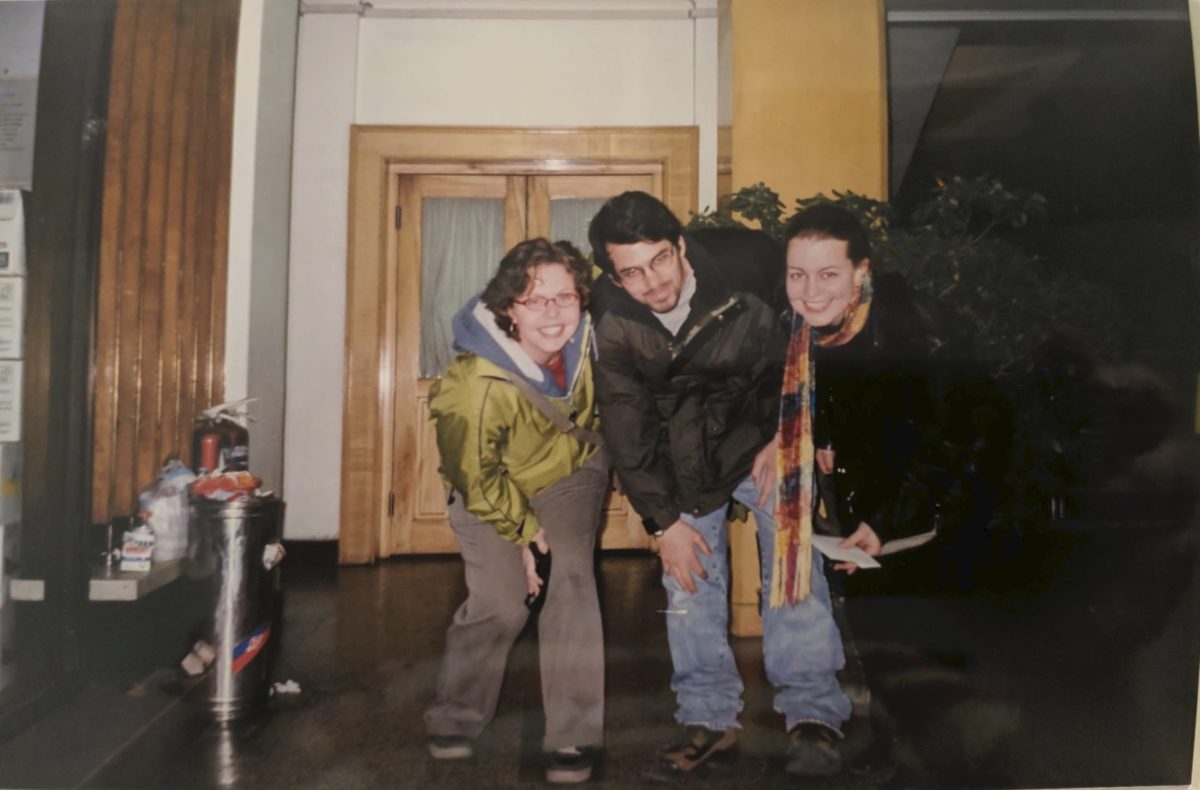Biden should bring back the China Fulbright program
If the Biden administration wants to undo the Trump administration’s foreign policy mistakes, restoring the China and Hong Kong Fulbright programs is a good and easy place to start.

It was 1999, and for the Fulbright program, Nickolas Zaller and I were pioneers. Never before had China hosted recently-graduated college students on the Fulbright program, and it only permitted five of us to come that August for a year-long fellowship. The following year, 26 U.S. students went to China on a Fulbright, and for the last 15 years, that number has hovered around 50 annually. And this is just the student program.
Altogether, approximately 200 Americans every year — students, professors, teachers, mid-career professionals — are afforded the opportunity to go to China to learn about the country, meet its people, and bring that knowledge back to their family and friends in the United States. And for the past decade, because the Fulbright program goes in both directions, more than 100 Chinese citizens have come to the U.S. every year to study on a Fulbright scholarship at colleges around the country, experiencing American culture firsthand.
But earlier this year, on July 14, with neither explanation nor warning — and buried deep in an Executive Order addressing the legal status of Hong Kong under U.S. law — the Trump Administration terminated the China and Hong Kong Fulbright programs. Criticism from American academics was swift. Two groups, the Association for Asian Studies and the Public Intellectuals Program of the National Committee on U.S.-China Relations, each condemned the shortsightedness of ending an instrumental program for developing U.S. expertise on China. Expertise, they argued, that ultimately benefits the U.S.
While the Fulbright program does further U.S. interests, promoting this as the primary reason to maintain it ignores the program’s actual goal: world peace through mutual understanding. “Knowing another culture may produce peace,” Senator J. William Fulbright said in a 1948 speech about the role of education in foreign affairs. If the Biden administration wants to undo the Trump administration’s foreign policy mistakes, restoring the China and Hong Kong Fulbright programs is a good and easy place to start.

It was no coincidence that Senator Fulbright proposed his international exchange program only a few weeks after the U.S. bombing of Hiroshima and Nagasaki. Always, in speaking about the program, Fulbright would begin and end with the belief that the availability of nuclear weapons pushed the world to the cusp of total annihilation. After witnessing the human destruction of two world wars, Fulbright saw nationalism as the cause of these conflicts. “The irrationality of unrestrained national rivalries makes it desirable to develop new concepts of the nation and of international relations,” he told an audience in Iceland in 1967. “The danger of universal destruction makes it absolutely essential.”
For Fulbright, one way to get us out of a pattern of destruction was international educational exchange: “Education exchange can turn nations into people, contributing as no other form of communication can to the humanizing of international relations…[it can] contribute to the feeling of a common humanity, to an emotional awareness that other countries are populated not by doctrines that we fear but by individual people — people with the same capacity for pleasure and pain, for cruelty and kindness, as the people we were brought up with in our own countries.”
By sending U.S. citizens abroad and having foreign students come to the U.S., the program could engender empathy between Americans and citizens of different nations. No longer would governments be able to vilify foreign cultures to an ignorant population. Returning Fulbright fellows would, according to Senator Fulbright, “be the source of true information about the people whom they have visited.” By taking international relations out of the exclusive realm of governments, Fulbright sought to democratize it.
But in terminating the China Fulbright program, the Trump administration eliminated this “source of true information,” making it easier for mutual enemies to bring the two countries deeper into conflict. “Fear of the stranger is a powerful influence in inducing conflict,” Senator Fulbright said in 1948 in describing the reasons underlying his program.
While the Trump administration has rightfully criticized China about the genocide in Xinjiang, the crushing of civil society domestically, the repression of Hong Kong, and China’s unfair advantage in global trade, it has also vilified the country solely to stoke a new red scare. In the last six months alone, the Trump administration has blamed China for the number of Americans lost to COVID, took the unprecedented step of closing the Chinese consulate in Houston in the name of national security, attempted to ban the Chinese video-sharing app TikTok on the grounds of national security, and begun to limit the number of Chinese students studying in the United States because of unspecified espionage concerns.
Senator Fulbright was not naïve enough to think presidents wouldn’t use his program for short-term policy goals. He added a provision to his bill that created the Fulbright Foreign Scholarship Board, which was to take the day-to-day operations of the program out of the executive’s hands. But the Trump administration has undermined even this portion of the program. Of Trump’s nine appointments, five are former Trump administration staffers, a far cry from the “distinguished representatives of cultural, educational student advisory and war veterans groups” that the Fulbright-Hays Act requires. Today, not a single member of the board has any experience in higher education, in the administration of international educational programs, or with the Fulbright program itself. For the past three years, the Trump-appointed board has failed to fulfill its statutorily-mandated duty to publish an annual report to Congress. The last annual report was published in 2017, when the board still comprised the previous administration’s appointees.
The Fulbright program — and its goal of world peace through mutual understanding — is worth saving, and the Biden administration should make restoring the China and Hong Kong Fulbrights a priority. At $244 million in 2016, the entire Fulbright program, serving over 160 countries, costs pennies to the taxpayer compared to the country’s 2016 military spending of $611 billion (the Fulbright budget amounts to less than 1% of the annual military budget). Importantly, partner nations share in the cost. In 2016, China contributed $1.4 million to the China Fulbright program, with the U.S. contributing $5.5 million.
Even at such a low cost, the Fulbright program has proven itself effective. In a series of surveys conducted between 2002 and 2005, the Department of State found that over 75% of U.S. Fulbright fellows maintained ties with the people they met abroad, and almost all stated that the Fulbright fellowship deepened their understanding of the people and culture in their host country. Studies have found a similar impact for foreign Fulbright fellows. In her 2017 study, Professor Meirong Fu of the Beijing Foreign Studies University found that many Chinese Fulbrighters found themselves to be “cultural interpreters,” providing a more nuanced understanding of the United States to colleagues, family, and friends upon their return from America.
But repealing Trump’s July 14, 2020 Executive Order that terminated the China and Hong Kong Fulbright programs is not enough. As the Trump administration has exposed, many of our institutions are weak. To ensure that the Fulbright program is never again misused to further an administration’s policy goals, the Biden administration and Congress must amend the Fulbright-Hays Act, the current law that governs the program, to include a provision that requires Congressional approval before an administration terminates a program. In addition, Congress needs to shore up the Fulbright Foreign Scholarship Board’s expertise. It should mandate a minimum number of members to have experience in higher education and prevent former administration staffers from serving on the board for three years after leaving the administration.
In many ways, Nick and I exemplify the Fulbright program’s empathy goal even though neither of us went into China studies. I became a public interest lawyer and Nick received his Ph.D. in public health. But for both of us, China — and what we learned that year — has remained important parts of our lives. As a legal aid attorney in New York City, I served as that “cultural translator” for colleagues, policymakers, and even judges, using my language skills to assist on housing cases, and even at times, testifying as an expert in immigration court about what could happen to an undocumented Tibetan sent back to China. I continue to write about China, in particular its human rights and legal developments. Nick, a professor at the University of Arkansas, focuses on addiction and mental health in U.S. prisons but continues to collaborate with Chinese public health professionals. One of Nick’s recent collaborations, analyzing the effective use of WeChat to administer preventative HIV care in China, has caused him to think about doing the same in Arkansas. “This stigma in China against gays, we see it in rural Arkansas too,” Nick told me. But for him, the greatest loss of the China Fulbright program is the opportunity to learn another culture: “That is the crucially important thing…that is what prevents nuclear destruction,” Nick told me, echoing Senator Fulbright’s fears.
Is the empathy Nick and I developed during our year in China enough to prevent armed conflict? I don’t know. But given the state of the world, it’s worth trying.






